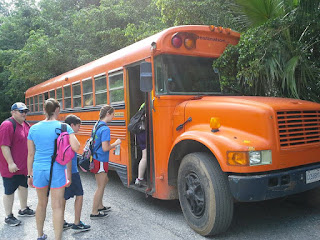1. The driving is reckless but not at the same time. The main road out here is two lanes, sometimes with a dotted yellow line and sometimes a solid or double line. However, that doesn't really mean anything. They pass in the opposite lane whenever they want. While we were driving to and from the baby rescue two weeks ago, our driver was weaving in and out like you wouldn't believe. There were a few times where I thought we were going to crash but he got back in our lane just in time. Even though we would be going at least 80 to pass them, he always used his blinker. I'm writing this in the bus and we were just passed by an 18 wheeler. It's crazy.
2. Related to that is the choice of vehicle. There are so many motorbikes which are ideal if you think about it. They're good for getting around the mountains and the curves but are also cheaper than a car and get good gas mileage. I've seen 3 people riding on the same bike. It is legal to sit in the bed of a pickup truck too. Ive seen some with more than ten people.
3. Everyone is very hospitable. There was a group from Liberty University that was at HOL for a month and is now staying with host families for another month. One girl I talked to said that her family essentially told her mi casa es tu casa. The mother said that they don't have much but there is a lot of love and that's what matters. They are so willing to share what they have even though it's not a lot. Everyone that we've visited while evangelizing has always welcomed us in and given everyone someplace to sit. Related to that, everyone always says hello to each other. If you pass them while walking, it's usually hola or buenas and a wave and if they'll honk to say hello in a car.
4. We've been eating a lot of rice, beans, some sort of meat, and corn tortillas. This is the standard meal for everyone.
5. On the way back from the baby rescue, Hugo asked Connor if he was married and had any children. He doesn't of course but that prompted a discussion at dinner about marriage. Most girls in the villages get "married" soon after they are able to have children. However, they don't really get married in the sense that we think of with the big wedding. It can take years for them to get their papers that say they are officially married so many don't even bother. It's more of an agreement per se. Many times the father/husband is not in the picture. They don't really understand the idea of being able to provide for their family and not having children until they are able to do that. They also don't really understand how they get pregnant. Health education is really lacking here.
6. They cut the grass and weeds at the side of the roads with machetes. It's actually rather effective.
 |
| Baby crocodile on a leash |
8. The women carry baskets of things on their head. It's a rather impressive feat.
 |
| The cattle coming home through the village |
10. Guatemalans are short. I tower above everyone in the village.
 |
| The river by Los Limones |


















































